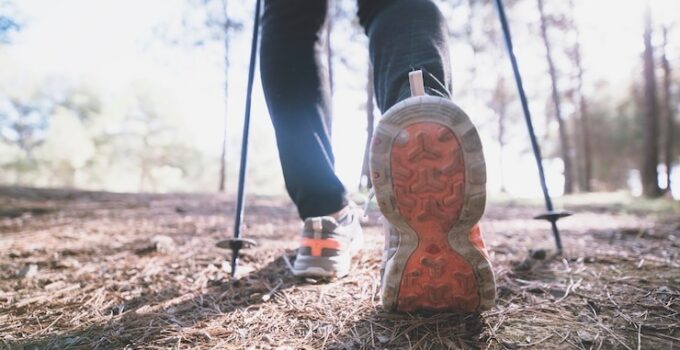The health benefits of hiking are undeniable and far-reaching, improving everything from cardiovascular performance to mental stability. Whether scaling a rocky peak or walking a shaded woodland path, hiking offers a full-body workout that refreshes your mind and uplifts your spirit.
In today’s fast-paced, screen-filled world, hiking provides a necessary escape that supports long-term well-being. Let’s explore the many dimensions of why hiking belongs in your weekly routine.
Page Contents
Physical Health Benefits of Hiking
The most obvious health benefits of hiking start with your physical body. Hiking improves cardiovascular health by raising your heart rate, which strengthens the heart and helps lower blood pressure and cholesterol levels over time. It’s a fantastic low-impact exercise adaptable to all fitness levels, allowing people to start slowly and build endurance gradually.
Another crucial benefit is building muscle strength. While walking generally targets the lower body, hiking engages your legs, core, and upper body, especially when trekking poles or climbing uphill. Hiking on uneven terrain improves balance and coordination by activating smaller stabilizing muscles often ignored by gym workouts.
Due to its weight-bearing nature, hiking helps increase bone density and reduce the risk of osteoporosis. Consistent trail time can also aid in weight management. Depending on the trail difficulty and pack load, hiking can burn between 400 and 700 calories per hour.
Beyond metabolic improvements, hiking strengthens your immune system. Regular exposure to various natural environments introduces your body to natural elements and beneficial microbes that can help improve immune resilience. Thanks to all these positive outcomes, hiking’s physical health benefits continue making it a top choice for fitness enthusiasts and beginners.

Source: freepik.com
Mental Health Benefits of Hiking
Not to be overlooked are the incredible mental health benefits of hiking. Being in nature reduces stress, decreases anxiety levels, and alleviates symptoms of depression. Studies show that hiking can lower cortisol levels and reduce negative ruminating thoughts.
Nature immersion naturally boosts serotonin and endorphins, elevating moods and mental clarity. Even short hikes—30 minutes to an hour—significantly improve focus and provide a much-needed mental reset. For individuals combating seasonal affective disorder (SAD), sunlight exposure during a hike enhances vitamin D production, which is essential for regulating mood.
Unlike synthetic medications, hiking is a natural antidepressant without the unwanted side effects. Combining rhythmic movement, fresh air, and natural surroundings encourages mindfulness and helps hikers stay mentally present. Whether on a challenging trail or a neighborhood nature path, the consistent mental health benefits of hiking reinforce it as a natural therapy.
Cognitive Benefits and Brain Health
Brain health is another area where the health benefits of hiking come clearly into focus. Regular hiking improves memory, enhances problem-solving skills, and fosters creative thinking. Your brain remains actively engaged as you navigate terrain and make route decisions.
Recent studies suggest that aerobic exercise, like hiking, promotes neurogenesis—the growth of new brain cells—in the hippocampus, a region vital for learning and memory. Moreover, hiking isn’t just good for your brain in the moment; it also supports long-term cognitive function and helps reduce the risk of dementia.
Many people notice clarity and sharpness in cognitive tasks after a hike. Activities in nature stimulate the prefrontal cortex less, giving the mind a chance to rest and reset. That’s why hiking often aids in creative breakthroughs, focus enhancement, and overall mental productivity.
Emotional and Social Benefits of Group Hiking
While solo hikes offer solitude and introspection, group hiking brings unique social and emotional rewards. Being a part of a hiking community or club allows for shared motivation, accountability, and a deepened sense of accomplishment. These emotional health benefits of hiking don’t just build friendships—they actively combat loneliness and foster resilience.
Group hiking promotes bonding over shared achievements, whether reaching a summit or overcoming challenging terrain. The sense of community encourages consistency and provides a valuable support network for those tackling health or emotional hurdles. People regularly report feeling happier and more connected after a group trek.

Source: freepik.com
Hiking for Longevity and Disease Prevention
The health benefits of hiking also extend into long-term well-being. Regular hikers enjoy a reduced risk of chronic diseases such as high blood pressure, Type 2 diabetes, and certain cancers. Hiking helps control blood sugar levels and improves insulin sensitivity—a win for anyone managing metabolic disorders.
Recent studies show that moderate aerobic exercise, such as hiking, lowers inflammation markers and reduces overall cholesterol. It is particularly beneficial for individuals with arthritis and fibromyalgia, minimizing stiffness and improving joint mobility.
Perhaps most impressively, hiking is linked to increased lifespan. Thanks to improvements in physical endurance, mental health, and social connectivity, long-term hikers often report fewer health complications as they age. These cumulative health benefits make hiking a sustainable practice for long-term vitality.
Hiking and Nature Therapy: The Healing Power of the Outdoors
Hiking offers more than just physical exercise—ecotherapy or nature therapy. Research shows that spending time in green spaces lowers mental fatigue and restores depleted mental energy. This phenomenon, sometimes called “forest bathing,” is clinically proven to reduce blood pressure, anxiety, and depressive symptoms.
Venturing into natural environments brings peace that indoor workouts cannot replicate. It replenishes our mental stores, strengthens our bond with the planet, and deepens our environmental awareness. Nature therapy encourages people to live more sustainably and mindfully—an emotional and ecological win.
Exposure to daylight naturally aligns your circadian rhythm, aiding better sleep quality. That’s why those who regularly hike often experience better rest and wake more refreshed.
Tips for Getting Started with Hiking for Health
If you’re new to hiking, the health benefits of hiking are well within your reach with a few smart steps. First, choose a trail that matches your current fitness level. Apps like AllTrails and Gaia GPS offer user reviews, elevation data, and trail maps to help you make a safe choice.
Assemble a basic hiking gear checklist: comfortable shoes (trail runners or hiking boots), layered clothing, a hydration system, and basic first-aid supplies to be prepared. Hydrate well and pack nutritious snacks like trail mix or fruit. Begin with shorter, flatter trails and increase duration and elevation as your endurance builds.
Consider keeping a hiking log or using a smart fitness app to track progress and milestones. This will help boost motivation and allow you to visualize your health improvements over time.

Source: freepik.com
Safety Precautions and Best Practices
Safety is crucial to maximizing the health benefits of hiking. Before heading out, let someone know your hiking plan, and check weather reports to avoid dangerous situations. Learn core navigation and map skills, even relying on a GPS device.
Prevent injuries with a pre-hike warm-up and stretching routine focusing on the calves, hamstrings, and lower back. Hike at a steady pace and take breaks when needed. Always practice Leave No Trace principles: pack out all trash, stay on marked trails, and respect wildlife.
Whether hiking alone or with friends, trust your instincts and know your limits. Overexertion can turn a health-boosting activity into a risky situation, so build your stamina gradually and hike smart.
Conclusion
The health benefits of hiking go far beyond physical fitness—this activity offers a complete wellness package for the body, mind, and soul. From burning calories to building strength to lifting spirits and illuminating thoughts, hiking heals holistically. Each step into the natural world brings a renewed sense of vitality, resilience, and purpose.
So, what are you waiting for? Whether hitting a quiet woodland trail or climbing your first summit, every hike brings you closer to optimal health. Let the trail become your therapy, your gym, and your sanctuary. Your journey to better health begins with one step—time to hit the trail and start reaping the many health benefits of hiking.
About Tom Guzman
My name is Tom Guzman, and I’ve dedicated my life to understanding the intersection of hunting, gear performance, and wilderness survival. Years of practical experience have shaped my belief in ethical hunting and meticulous preparation.
I launched Trophy Pursuit to share that perspective, combining boots‑on‑the‑ground insight with the reach of digital marketing and SEO.
Through my articles, I strive to arm every hunter—from curious newcomer to veteran woodsman—with trustworthy guidance on equipment, strategy, and backcountry resilience, ensuring each venture into the wild ends with knowledge gained and goals achieved.




